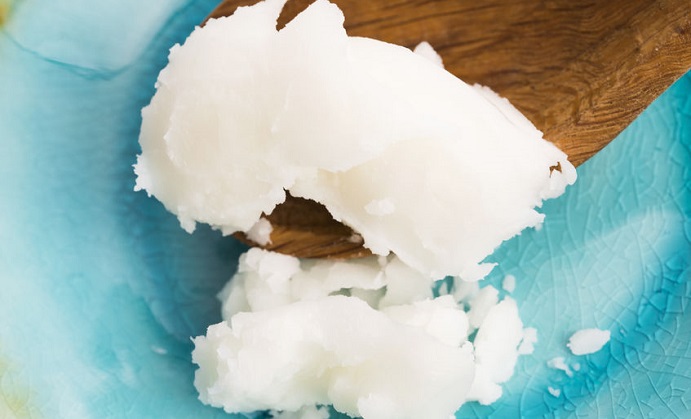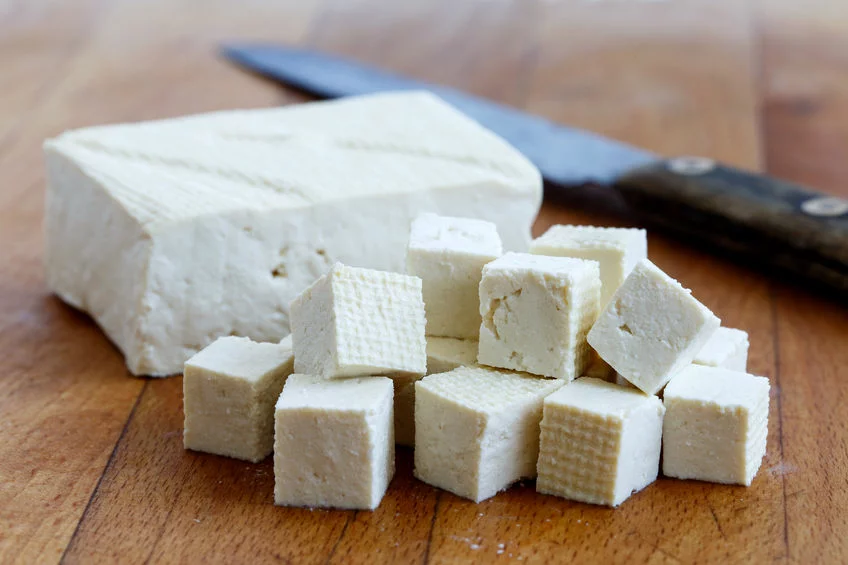Coconut oil, like many celebrities, became hugely popular and then started receiving some stinging backlash. With impassioned advocates on both sides, reading the literature can get confusing. As with most foods, what really matters is what else you are eating. If you’re sticking with a ketogenic diet, what’s important to you is if coconut oil is not only compliant with the keto lifestyle but also if it is, in fact, the best oil you can be consuming to hack your way to keto success.
In order get to the truth about coconut oil and keto, we need to understand the chemical composition of coconut oil in order to fully grasp how it behaves when it enters our body as well as if it can help stimulate ketosis. At the end of this article, you’ll have a firm understanding of how and if you should add coconut oil to your diet and what it will mean for your ketogenic diet.
What is Coconut Oil?
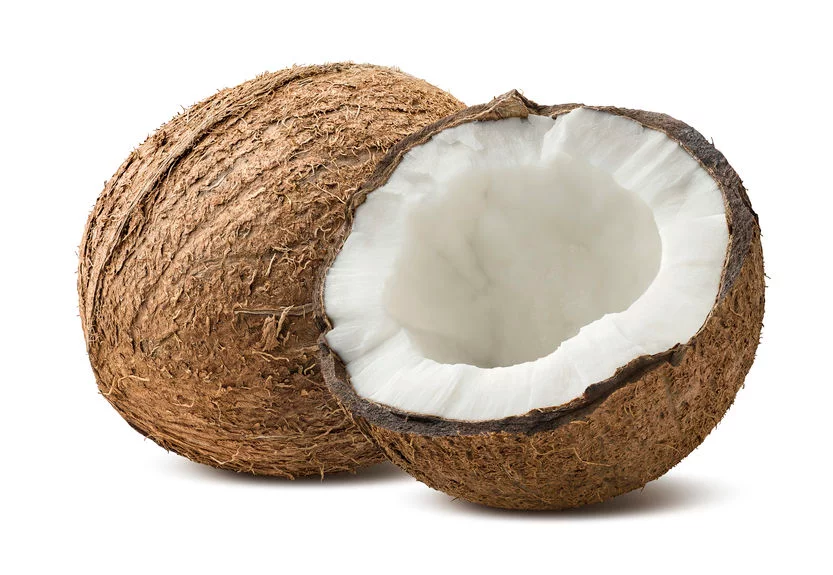
Coconut oil is an oil derived from the meat, or the white fleshy part, of the coconut. However, coconut oil can be procured differently and because of that, not all coconut oils are created equally. The method of how this oil is extracted makes a large difference in its nutritional value. Take a look below at the different types of coconut oil available on the market today:
- Virgin or unrefined coconut oil – Made from fresh coconut meat without using any chemical processing. Many times it will be advertised as ‘cold pressed’ meaning that its processing does not exceed 120 degrees. This results in better-flavored oil with no loss of key nutrients.
- Refined coconut oil – Made from dried coconut meat using high heats of over 400 degrees as well as chemical processing such as bleaching and deodorizing. This results in a lower quality oil which is stripped of many of its nutrients.
- Partially hydrogenated coconut oil – Hydrogen is added to the oil, just like all unhealthy hydrogenated oils such as margarine. This means it can raise your LDL levels which may contribute to heart disease and type 2 diabetes.
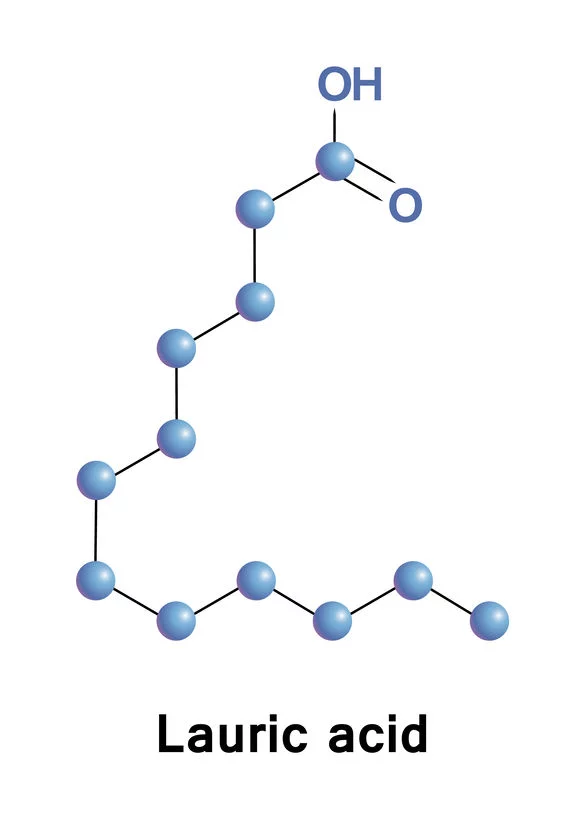
For the rest of this article, when we refer to coconut oil and keto, we’ll be talking only about unrefined coconut oil. It is this type of coconut oil which contains about 60% to 70% of its fat coming from medium chain triglycerides, aka MCTs. Around half of that is lauric acid, which is credited for many of the health benefits of coconut oil. We’ll discuss these benefits later on.
What Are MCTs?
If you’ve been doing your keto diet research, you know that MCTs are mentioned quite a bit. But what exactly are they? MCT stands for Medium Chain Triglyceride and it is a type of fat. Perhaps you’ve heard the of the term triglyceride before. It refers to fats which are composed of 3 fatty acid chains.
A fat with one fatty acid chain is called a monoglyceride, with two fatty acid chains is a diglyceride and with three fatty acid chains is called a triglyceride.
Most oils and animal fats are triglycerides. Understanding the chemistry of the specific kind of the triglyceride called Medium-Chain Triglycerides will help to understand why they are ideal for our bodies to break down for energy.
Medium Chain Triglycerides and Why You Need Them For Ketosis
Each fatty acid chain is composed of a carbon backbone which can be anywhere from 4 to 24 carbons long. We categorize fatty acid chains in three different lengths. It is these lengths of the three fatty acid chains found in a triglyceride molecule determine whether the fat is considered short chain, medium chain or long chain.
So now that we understand a bit about what Medium Chain Triglycerides look like, we can use this information to figure out what happens when the coconut oil (containing MCTs) we eat enters our bodies.
Breaking Down The Fat
When you consume oil in your diet, it gets broken down in your body and then either used as energy or stored as fat. Unless someone’s trying to gain weight, the ideal would be to eat those fats which we can convert directly for energy instead of forming fat cells to pad our bodies.
What studies have shown, is that when you consume Medium Chain Triglycerides instead of Long Chain Triglycerides, they are converted into energy straight away in the liver and used immediately. Long chain triglycerides, by comparison, take longer to break down and will get stored as fat cells in your body.
It seems that the easier it is for your body to break down, the easier it will be to use for energy right away.
MCTs have a shorter carbon chain length and are broken down into ketones by the liver so they are absorbed into the body faster and burned quicker than LCTs. Therefore, instead of being stored as fat cells in your body, the energy from MCTs are ready and available for your muscles and organs to use immediately. Since it takes longer for your body to break down long chain fatty acids, it means that there will be more fat cells created as a result.
Where Do Ketones Come In?
As followers of a ketogenic diet know, in order to enter into a state of ketosis, one needs to have a certain level of ketones in the bloodstream. Ketones are formed when fats are broken down.
The way in which the liver breaks down medium chain triglycerides, such as coconut oil, quickly into ketones means that you have an increased burst of energy.
Can MCTs Actually Increase Your Metabolism?
Metabolism refers to all the chemical processes that occur in your body. When people have a high metabolic rate, they burn calories faster and are able to lose weight faster. There are documented ways to increase your metabolic rate, such as:
- Lifting weights
- Getting adequate sleep every night
- Drinking cold water
But what if certain foods you eat could also increase your metabolic rate?
Your total daily energy expenditure (TDEE) is the total amount of calories which you burn during the day. From all of that, a small percentage – about 10% – is the TEF.
The TEF is the thermic effect of food, i.e. how much energy your body spends breaking down food.
What all this technical jargon means is that out of all the calories you burn during the day – by exercising, working and even reading this article, some are burned by breaking down the food you have eaten. By choosing the right foods, you can control how much energy your body spends. In other words, you can eat the same amount but burn more calories! For example, it takes a longer time to break down protein than it does for carbs. Fiber also takes a while.
When it comes to studies done on the TEF of fats, there have been very interesting results. Medium Chain Triglycerides have been clinically shown to raise your energy expenditure. You can take a look at this study where Medium Chain Triglycerides were found to increase metabolism by 12% as compared to Long Chain Triglycerides, which raised it by 4%. Therefore, coconut oil and keto work together very well for this reason. Another study shows that MCTs have 10% less calories in them than LCTs.
As a side note, many people forget the importance of adding in keto friendly vegetables and
MCTs: Why Coconut Oil and Keto Make Sense
So, to sum up why it’s important to pair coconut oil and keto diets together:
- Readily available so not stored as much as fat cells like LCTs
- MCTs have less calories than LCT (10% less)
- Shown to increase metabolism/energy expenditure
Health Benefits Beyond Coconut Oil and Keto
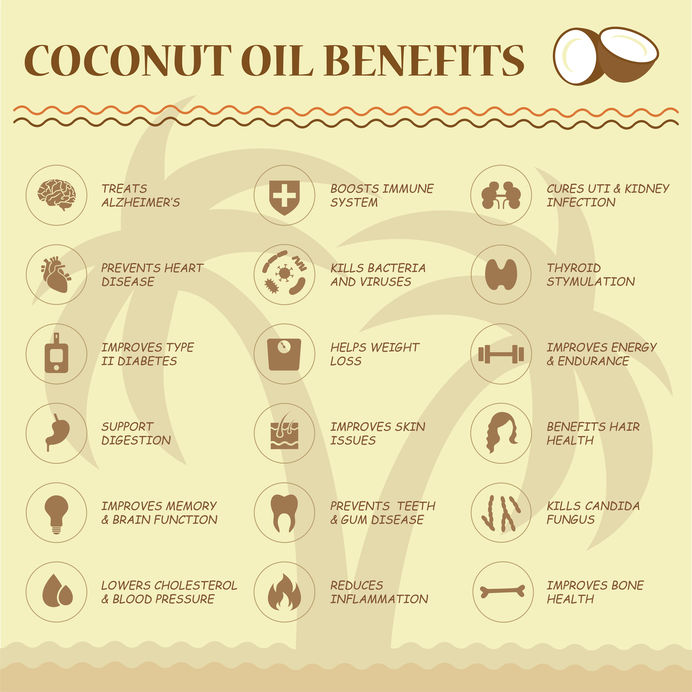
In addition to boosting ketosis, coconut oil contains many health benefits. Many of these are attributed to lauric acid as coconut oil is the largest natural source of this type of MCT. However, it is still being researched to determine whether it’s just lauric acid or the combination of all the nutrients working together within coconut oil.
Some of the areas where coconut oil has been shown to help are:
- Skin issues – Used to treat skin irritations such as psoriasis and acne.
- Hair health – Nourishes hair and combats loss of hair proteins.
- Brain function – Shown to improve memory function and are being studied as aiding patients with Alzheimer’s disease.
- Antibacterial properties – Can help fight infections due to its anti-fungal, antiviral and antibacterial properties.
- Blood sugar regulation – Can help people with diabetes.
- Cholesterol – May contribute to preventing heart disease by managing cholesterol levels.
Our Take Away on Coconut Oil and Keto Diets
The combination of coconut oil and keto is one that has been proven to not only bring about success on the ketogenic diet but also to provide other health benefits. Cooking and baking with coconut oil results in not only a better way to boost ketosis but also adds a unique and delicious flavor to enhance your favorite recipes.
Do you want to find an effective Keto treatment? Check out our top rated Keto products


